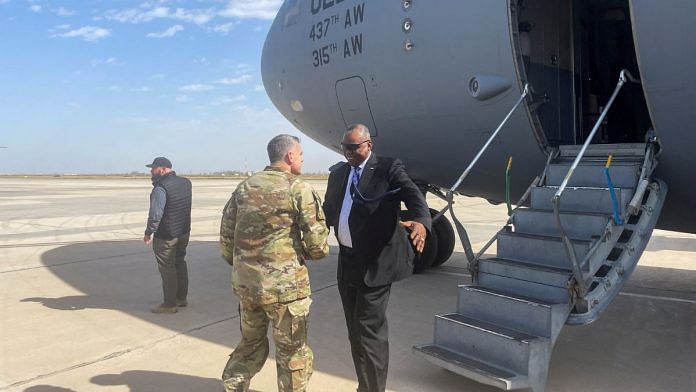Baghdad/Erbil: U.S. Defense Secretary Lloyd Austin, making an unannounced trip to Iraq on Tuesday nearly 20 years after the U.S.-led invasion that toppled Saddam Hussein, said Washington was committed to keeping its military presence in the country
The 2003 invasion led to the deaths of tens of thousands of Iraqi civilians and created instability that eventually paved the way for the rise of Islamic State militants after the U.S. withdrew its forces in 2011.
Austin, the most senior official in President Joe Biden’s administration to visit Iraq, was the last commanding general of U.S. forces there after the invasion.
“U.S. forces are ready to remain in Iraq at the invitation of the government of Iraq,” Austin told reporters after meeting Iraqi Prime Minister Mohammed al-Sudani.
“The United States will continue to strengthen and broaden our partnership in support of Iraqi security, stability, and sovereignty,” he said.
Sudani later said in a statement that his government’s approach is to maintain balanced relations with regional and international governments based on shared interests and respect for sovereignty, and that “the stability of Iraq is the key to the security and stability of the region”.
The United States currently has 2,500 troops in Iraq – and an additional 900 in Syria – to help advise and assist local troops in combating Islamic State, who in 2014 seized swathes of territory in 2014 in both countries.
Islamic State is far from the formidable force it once was, but militant cells have survived across parts of northern Iraq and northeastern Syria.
Symbolism
Austin’s trip is also about supporting Sudani’s push back against Iranian influence in the country, former officials and experts said.
Iranian-backed militia in Iraq have occasionally targeted U.S. forces and its embassy in Baghdad with rockets. The United States and Iran came close to full-blown conflict in 2020 after U.S. forces killed Iran’s Revolutionary Guards commander General Qassem Soleimani in a drone strike.
“I think that Iraqi leaders share our interest in Iraq not becoming a playground for conflict between the United States and Iran,” a senior U.S. defense official, speaking on condition of anonymity, said.
Austin met Sudani and will meet the president of the Iraqi Kurdistan Region, Nechirvan Barzani, amid a long-running dispute over budget transfers and oil revenue sharing between the national government and Kurdish government.
Former President George W. Bush’s administration cited its belief that Iraqi leader Saddam Hussein’s government held weapons of mass destruction to justify the decision to invade Iraq. U.S. and allied forces later found that such stockpiles did not exist.
Between 185,000 and 208,000 Iraqi civilians were killed in the war, according to the Costs of War Project by the Watson Institute for International Studies at Brown University.
Austin, a former head of all U.S. forces in the Middle East, said in 2011 that the United States had achieved its military objectives in Iraq.
But under former President Barack Obama, the United States sent thousands of troops back into Iraq and Syria three years later to bolster the fight against Islamic State.
(Reporting by Idrees Ali in Baghdad, additional reporting by Amina Ismail in Erbil; Editing by Andrew Heavens, Angus MacSwan and Emelia Sithole-Matarise)
Disclaimer: This report is auto generated from the Reuters news service. ThePrint holds no responsibilty for its content.
Also read: One killed, dozens injured as stampede breaks near football stadium in Iraq’s Basra



